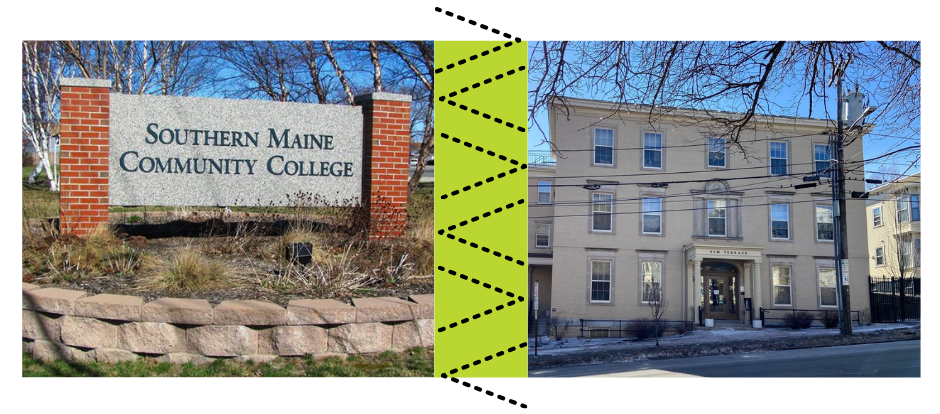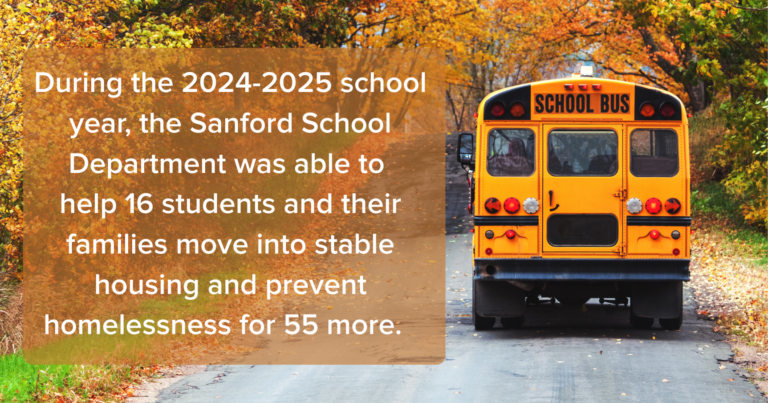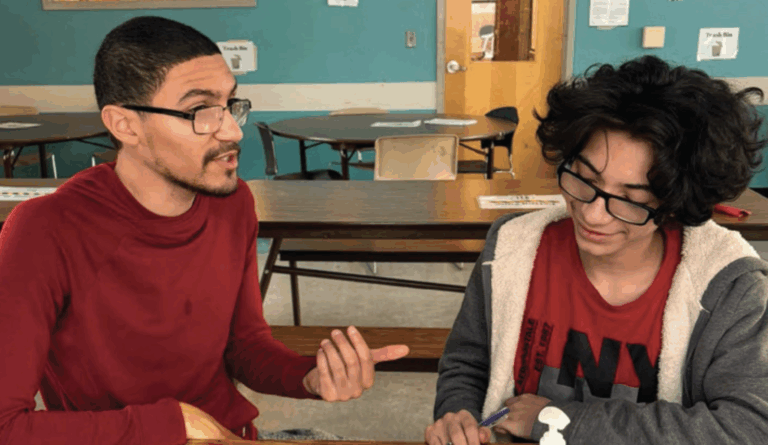Building on its successful two-generation model, McAuley Residence adds new resources to support educational pathways for families in recovery
A bridge and a couple of miles are all that separate McAuley Residence in Portland from Southern Maine Community College (SMCC) in South Portland. But for the women of McAuley Residence – a residential program for mothers in substance use disorder recovery – getting to the college, and receiving the benefits that education would offer them and their children, can seem like an impossible reach. A new partnership between McAuley Residence and SMCC, with support from the John T. Gorman Foundation, is creating new education opportunities to help moms and their children close the distance.
Strengthening McAuley Residence’s innovative model
Part of Northern Light Mercy Hospital, the nationally recognized McAuley Residence has two locations, with 15 family apartments in Portland and 10 in Bangor. Participants progress through three program phases over a period of 18 months to two years. In the first phase, women connect with a network of health providers and community partners to stabilize and access treatment while building a durable network of support. The second phase is aspirational, with women exploring career and education options. In the third phase, they secure outside housing and receive continued support for a successful transition into their new lives.
What makes McAuley Residence even more successful is the two-generation model it uses to support mothers and their children simultaneously. If mothers have lost custody of their children, there is a closely monitored process with the state to reunify them – with many families eventually living together in the residence. A parent coach from The Opportunity Alliance provides critical support and skill-building to help make the reunifications successful. And after being assessed for their own trauma and needs, children in the program receive a range of coordinated supports – including healthcare, counseling, and access to quality early education.
McAuley Residence has had persistently positive results for the rate of family reunification and sustained recovery. But Melissa Skahan, who heads the program as the hospital’s Vice President of Mission Integration, said one trend began to concern her in recent years – a decline in the number of women enrolled in college. Eager to provide for their families, more women were choosing to enter the workforce in entry-level or low-wage jobs.
“When I saw the decline in enrollment, that’s when I realized we had to do something different,” Skahan said. “The last thing you want to do is reunify a family and have them exit McAuley and live below poverty level. You really have to do that aspirational piece.”
In response, McAuley Residence has partnered with SMCC to provide an education coach at its Portland location – someone to work with women around their career and education goals broadly, but also act as a bridge to help women enroll and take classes at the college. Funding from the Foundation supports the education coach position, as well as access to education supports and the development of a family learning curriculum.
“What is impressive about McAuley Residence is the work it does to continually refine and strengthen its model, using research and evidence-based practices to respond to the emerging needs of the families it serves,” said Jennifer Beck, the Foundation’s Vice President, Programs. “It’s been very exciting to see this new partnership develop and to know that the moms are being supported on their education and career pathways, which we’re confident will bring many long-term benefits to them and their children.”
Education opens new possibilities for families

With a background in both social work and education, Success Coach Kristen Stevens began her work last August, having had years of experience bringing educational opportunities to underserved populations, including incarcerated women.
Stevens said the women’s goals vary widely – some have had little education or work experience while others have advanced degrees. For most, though, the first step in the process is helping women shift their perspective to define themselves by their strengths rather than past mistakes and traumatic histories. The journey of their recovery is an asset rather than a liability, Stevens said. “The problem solving, the survival, tenacity, resilience – that sets you above and apart.”
Stevens coaches women individually and also runs a weekly group covering everything from resume writing and job applications to addressing recovery in a job interview. At the same time, she is reaching out to employers in the community to find supportive workplaces where women can apply their talents.
Stevens also teaches a course at the residence called Opportunity Ready, where participating students earn college credits at SMCC. The course includes lessons on personal development, the array of offerings at SMCC, skills they need to be successful as students, and how education can fit into fulfilling career pathways.
Moreover, as part of the family learning model McAuley Residence is working to develop, each lesson has a component for children. While moms learned to navigate SMCC’s website, for example, their children had a scavenger hunt on campus. “You’re in school and your mom’s in school, too,” Stevens tells the children. “That’s huge for a child to see.”
Skahan said the new supports have touched every woman in some way, and that it has been powerful to see several take the first steps down the college path. “There is nothing more beautiful than women finding their voice, reunifying with their children, and embracing transformation,” Skahan said. “The addition of the education coach opens a world of opportunities and sets a path towards a life that most felt was out of reach.”




